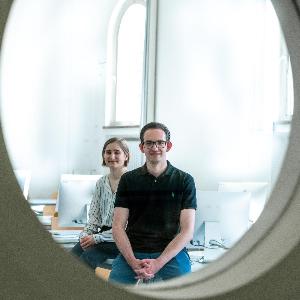Criminal law: Crime in the digitalized world
10 Aug 2021
A series of seminars in the Law Faculty shed light on new forms of crime in the age of the Internet. Some of the resulting work has now been published in an online magazine.
10 Aug 2021
A series of seminars in the Law Faculty shed light on new forms of crime in the age of the Internet. Some of the resulting work has now been published in an online magazine.

Laura Schachtner focuses on people’s data collected using the “coronavirus warning app, Ramon Kohler highlighted cyberbullying.
Cyberbullying, virtual trespassing, right-wing extremism online: criminal phenomena in the virtual space was what law students were looking at in the first series of basic and specialized seminars on “Digitalization in Criminal Law and Criminal Procedural Law” at LMU. Eight of the most successful papers written for this seminar series have now been published in an anthology in the KriPoZ criminal policy journal under the heading of “Junges Publizieren” (Young Publishing). In addition to papers on “Storage of retained data—an (in)finite history” and “Prosecution of right-wing extremism on the Internet,” other works including “European surrender and security order” were among the titles published in the online legal journal.
“For our students,” says Professor Mark Zöller, who led the seminars last winter semester at LMU, “the first publication of their own is a special incentive and a great reward.” Student Sophia Weis wrote a paper with the title “Digital trespass as a crime,” which describes unauthorized access to IT systems using malware or similar. Examples include the hacker attacks on the German Bundestag and ransomeware attacks on hospitals. In her seminar paper, Weis advocates expanding existing laws and making them clearer. In addition, she says, investments in hardware and software are essential to better prevent digital trespassing from ever happening—because the fact that online perpetrators can act anonymously and internationally makes them hard to catch. Meanwhile, student Sabine Reschke looked into the crime of cyber-grooming. The phenomenon, which describes the initiation of contact with children on the Internet with the aim of sexual abuse, is “an enormous danger,” especially in these coronavirus times, she writes. “Children and young people are spending even more time on the Net because school lessons are taking place online,” the seminar paper states. This makes them “easy targets for cyber-grooming in social networks and online games.”
For our students, the first publication of their own is a special incentive and a great reward.Professor Mark Zöller
How the problems of the coronavirus crisis have affected criminal procedural law was illustrated by Laura Schachtner in a paper on “Criminal procedural access to cell phone data and guest lists in the pandemic.” The paper focuses on people’s data collected using the “coronavirus warning app,” for example, or on guest lists at restaurants. “These have been used by the police in some German states to help solve crimes,” the student writes. “This has raised the question of whether this kind of data collection is actually allowed.” Finally, law student Ramon Kohler’s seminar paper entitled “Cyberbullying” highlighted the various forms of this phenomenon—from online harassment to cyber-stalking and so-called happy slapping. The student also explored the extent to which legal protection against cyberbullying already exists in German law. Professor Zöller believes the fact that the oral presentations on the seminar papers had to be held by video conference due to the pandemic is further evidence of “how far-reaching digital technology has become in our everyday lives.” As he writes in the foreword to the “Junges Publizieren” anthology, one “does not have to be a prophet” to predict that in security law as in so many other spheres, digitalization will be one of the main fields of activity for legal scholars of the future.
The papers published in KriPoZ can be found at https://kripoz.de/2021/05/07/21307/ .